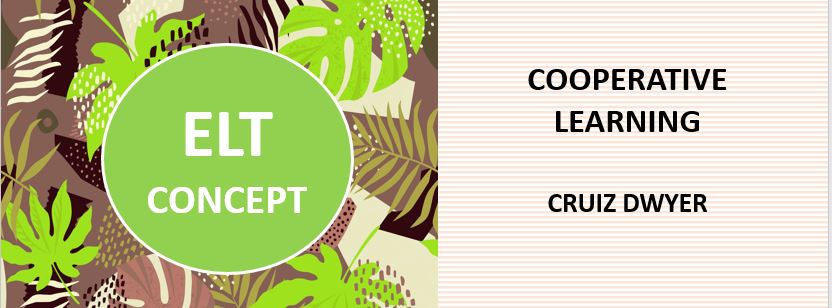ELT Concept #10 – Cooperative Learning
Cruiz Dwyer
What is it?
Cooperative learning occurs when students are grouped with others and engage in language learning. This style of learning encourages interdependence by allowing students to help one another. As cooperative learning is a form of social interaction, students are also incidentally working on their social skills.
Cooperative learning is student-centred and focuses entirely on cooperation between learners. The learners work together to achieve mutual goals. So, learning becomes a shared experience that opens new avenues for students to engage in the act of language learning.
Why is it important?
Language is intrinsically social by nature, and the interactional nature of cooperative learning leans heavily into this social element. Regardless of the aim of the task being done, the pair or group work means that both input and output are in constant use. This facilitation of language provides the opportunity to strengthen students’ language skills.
Additionally, the emphasis on group work can make accountability a collective concern. But this needs to be monitored to ensure dominant students do not overwhelm others. As language learning involves social networking, learners need to establish rapport and equality. This, in turn, requires the use of social skills to navigate conversations. Cooperative learning is more than language learning: it is the very act of socialization.
Cooperative learning can invoke the attributes of many other student-centred approaches. One such example is peer corrective feedback, which is a form of cooperative learning. Instead of the teacher marking a student’s written task, another student can do so. They will also provide feedback on where improvements can be made. This is especially true if the feedback is implemented verbally. The giver and receiver of the feedback loop are both interacting with one another. They are realizing the goals of language learning and socialization.
My Reflection
While I did not learn the term ‘cooperate learning’ until recently when I did my graduate studies at NIE-NTU, it is a concept that I already employ throughout my classes. There are very few instances where I have students perform tasks in-class by themselves. There are a variety of reasons for this, notably that my students are paying clients, and because the homework I assign them is their solo work tasks.
As language naturally promotes interaction, I believe that students need to interact with others to improve. Regardless of the task, students have many opportunities to explore language with other students. This allows them to negotiate the meaning and to share what they know. By working together, student’s own knowledge can grow. And activities can be accomplished with their combined language skills.
Having students perform cooperative learning equally makes it far easier for me to facilitate them. I can indirectly engage with a larger macrocosm of communication that would be lost from individual work. This is crucial because I often have classes with unequal skill levels. Having high-proficiency students solidify their knowledge and skills by aiding lower-proficiency students becomes an important step in the language journey for both students.
ELT Concept #9 – Comprehensible Output

